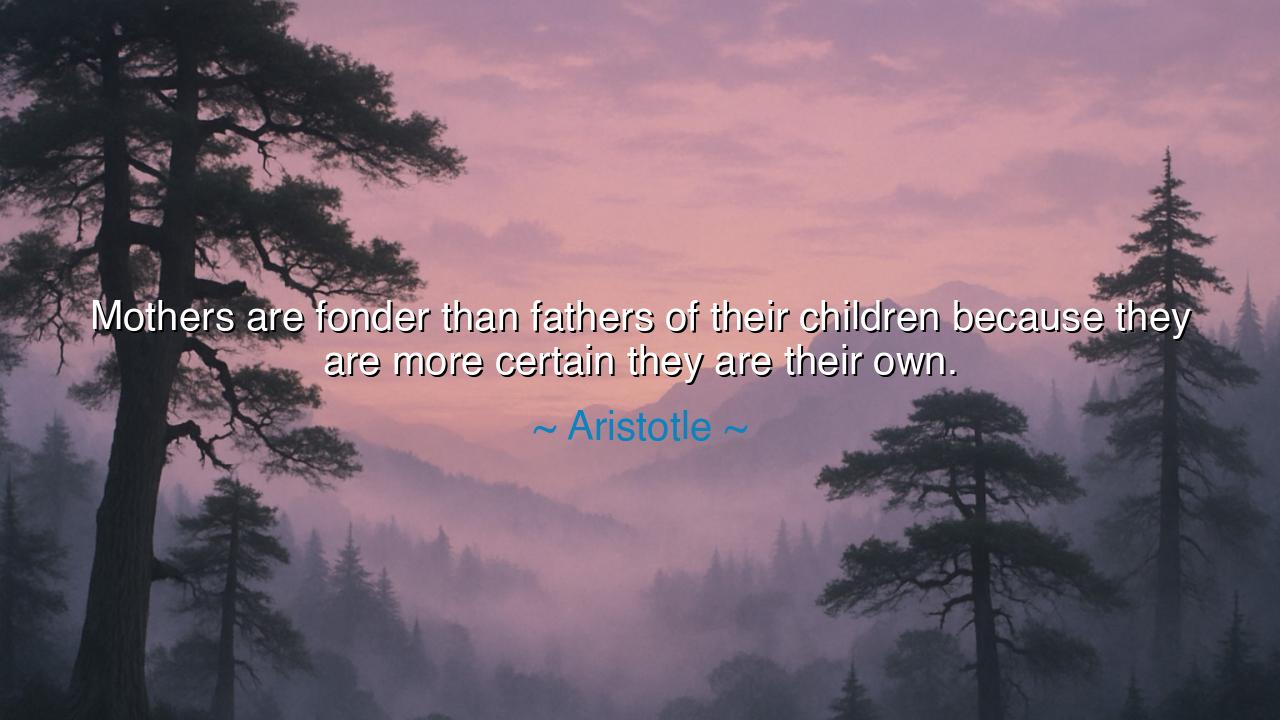
Mothers are fonder than fathers of their children because they
Mothers are fonder than fathers of their children because they are more certain they are their own.






In the wise and provocative words of Aristotle, “Mothers are fonder than fathers of their children because they are more certain they are their own,” we hear not merely the musings of an ancient philosopher, but a timeless observation about the nature of love, certainty, and connection. At first, his words may seem pragmatic, even cold—a statement about lineage and biology—but beneath them lies a profound reflection on the depth of a mother’s bond. Aristotle, who studied the essence of human nature with unmatched precision, recognized that a mother’s love flows from an unbreakable truth: she has carried life within her. Her connection to her child is not one of doubt or distance—it is immediate, physical, and sacred.
Aristotle, the philosopher of reason and balance, sought always to understand why humans feel as they do. In his work Nicomachean Ethics, he pondered not only virtue and justice but also affection—the ways in which love binds families and societies together. This quote finds its origin in that same inquiry. In a time when lineage determined inheritance, legacy, and identity, Aristotle observed that fathers could only claim their children through faith, while mothers knew their bond by the proof of birth itself. Yet his insight reaches far beyond bloodlines: it reveals how certainty deepens affection, how knowledge of one’s part in creation strengthens love, and how the maternal bond, born of both body and spirit, holds a special kind of power.
To understand this wisdom fully, one must consider what it means to bear a child. The mother is the first to feel life stir beneath her ribs, the first to suffer pain for another’s existence, the first to feed and protect without question. Her love begins not with recognition, but with creation. This experience—unique, total, and embodied—grants her a closeness no one else can claim. A father’s love, though noble and vital, is often built over time through trust and shared life. But the mother’s begins before the child’s first breath. It is not an affection earned; it is instinctive, written into her very being.
The ancients honored this mystery with reverence. In Greece, Demeter, goddess of the harvest, was said to love her daughter Persephone beyond all measure. When Persephone was taken from her to the underworld, Demeter’s grief halted the growth of all things—winter fell upon the world. Only when her daughter returned each spring did life begin again. The tale was not simply about seasons, but about motherhood: the unyielding devotion that transcends reason, time, and even death itself. Aristotle’s words, though clothed in philosophy, echo this mythic truth—that a mother’s certainty of love is a force that sustains life itself.
Yet there is also humility in his reflection. For while the mother’s love is assured by nature, the father’s love must be chosen and cultivated. In this, Aristotle reminds us of the different kinds of strength found in parenthood. The mother’s affection is immediate and unshakable, born of certainty and sacrifice; the father’s, though perhaps less instinctive, can be just as profound when it grows from devotion and will. Love, then, is not merely a matter of birth, but of commitment—and in this, both mother and father play sacred roles. Still, it is the mother’s closeness to the mystery of life itself that gives her love its unique intensity.
History offers countless examples of this truth. Consider Nancy Hanks Lincoln, mother of Abraham Lincoln. She died when he was only nine, yet her influence shaped his soul forever. Lincoln once said, “All that I am, or hope to be, I owe to my angel mother.” Though her time with him was short, her imprint was eternal. She had carried him through hardship, poverty, and uncertainty, instilling in him faith and moral strength. Her love, rooted in the certainty of motherhood, became the foundation of a life that would guide a nation through its darkest trial. Hers was the fondness Aristotle described—not fleeting or conditional, but born of deep knowing and selfless endurance.
Let this truth be a lesson to all who live: the bonds of love are not measured by possession or power, but by certainty and care. The mother’s certainty comes from the body; yet all of us, whether mothers or not, can learn from her example—to love fully, without hesitation, and without doubt. Love that hesitates is weak; love that knows itself is eternal. The mother’s heart does not question whether her child deserves her affection—she gives it freely, for love itself is her nature.
Thus, Aristotle’s ancient words remind us that motherhood is more than a role—it is a revelation. It teaches us the kind of love that needs no validation, the kind that exists because it must. And though he spoke as a philosopher, not a poet, his wisdom carries the rhythm of timeless truth: that the certainty of love—whether born from blood or chosen by heart—is the foundation upon which all goodness in the world is built. For to love with certainty is to love as the mother does: fiercely, eternally, and without question.






AAdministratorAdministrator
Welcome, honored guests. Please leave a comment, we will respond soon